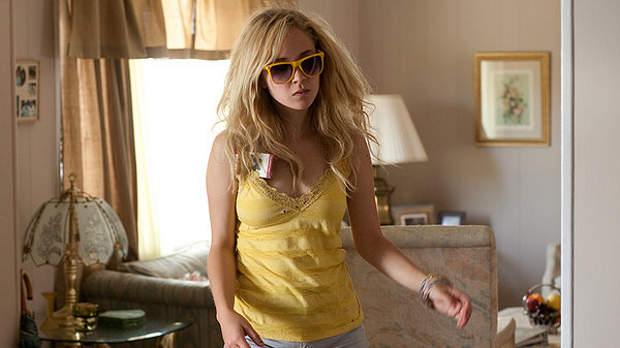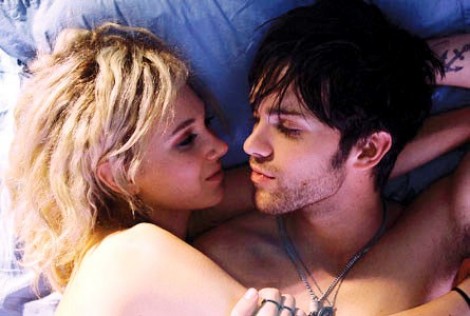 Back to selection
Back to selection
Juno Temple: Indie’s Ingenue

Juno Temple is on the move. For an interview regarding her loaded roster of new roles, in films as disparate as Killer Joe, Jack and Diane, The Dark Knight Rises, and Little Birds (released this Friday), the 23-year-old blonde Briton is calling from a car, which is shuffling her from one L.A. commitment to the next.
“I’m sorry, I might lose you,” she says through a bit of static, shortly before the call is indeed dropped. But within moments, Temple is back on the other end again, her coo of an accent as beguiling as her onscreen presence.
The whole scenario is one big hulking metaphor for Temple’s meteoric rise, as she’s steadily careened from project to project over the last six years, rarely failing to make a connection with her audience. A versatile beauty who can look cheeky, modelesque, or dangerous depending on the expression, the young actress has fast transcended her post as a habitual scene-stealer to become a formidable filmic bad girl—the one you call when you want your 20-ish female character to all but punch a hole through the screen.
From just about the beginning, Temple hasn’t been much interested in currying favor from viewers, at least not in the manner of a traditional ingénue. Rather than breathing life into likable, bright young things, she’s played back-talking brats, deceitful frenemies, promiscuous outcasts, and bisexual rebels, imbuing each with a singular fervor she unabashedly owns. In 2006’s Notes on a Scandal, her first high-profile film, she played the insolent, boy-crazy daughter of Cate Blanchett’s cougar, and ably seized the opportunity to tell off Judi Dench. The following year, in Atonement, she fearlessly nailed the love-to-hate character of Lola, a spoiled and madly enamored rape victim who unwittingly takes part in the film’s inciting incident.
From there, Temple has pressed forward in an odd mix of period and contemporary fare (from Year One and The Other Boleyn Girl to Greenberg and The Three Musketeers), the common factor being that her characters aren’t easy to look away from. As she’s progressed, she’s also actively continued to carve out a wild and unruly image, marked by an ample amount of sexuality and a scant amount of compromise. The overarching badass-ery of her still-budding career begs one question above all: Is she comparably defiant in real life?
“I’m just really good at faking it,” she says with a light cackle. “No, I think my heart’s just really drawn to those characters at the moment, and when you’re drawn to something you can really give it your all. With certain things, I’m rebellious, for sure. But I grew up in a family that’s kind of hard to rebel against, honestly. Rebelling against my parents, I would have to become a parking warden or something. Rebellion’s kind of a different thing for me in that I grew up with my parents just kind of saying, ‘Be who you want to be—go do that.’”
Born in London and raised in Somerset, Temple is the daughter of movie producer Amanda Pirie and the film director Julien Temple, whose career kicked off with short films about the Sex Pistols, and has since included documentaries, music videos, and features. The product of a communist family who was expelled while only in grammar school, Julien has long had the makings of a rebel-raising father, even before he was helming videos for the likes of David Bowie and The Rolling Stones. It was he who put his daughter in her first film, 2000’s Pandaemonium, a drama about English poets Coleridge and Wordsworth, in which Julien also directed Linus Roache and Samantha Morton.
Morton would be the first of many classy contemporary actresses with whom Temple would share both scenes and professional perspective. Temple has acted opposite Blanchett, Keira Knightley, Natalie Portman, and Anne Hathaway, and she counts Blanchett, Kate Winslet, and Michelle Williams among the leading ladies who currently inspire her most.
“They are actresses,” Temple stresses. “You don’t know the bullshit about their lives. And I completely admire that. You go and see them in a movie and you completely forget that you’re watching them. You’re locked in a character. And I find that extraordinary because, as an actor, you have to be able to turn on this entire other world and get lost in it. And I really feel that with those women. That’s something I want to learn to be able to do. And I think, back in the day, you had your acting persona, and that’s who you’d turn out to the premiere with or whatever, and then you’d go home and your life would be private. And we don’t really have that anymore. But I love that whole idea—when you’re going to events and things and you’re still working, and then your home life is something nobody needs to know about. Why should they?”
Temple also turns to nostalgia when discussing her sexuality, of which she’s shown a fierce command that’s highly uncommon for a starlet so young. Her vintage idols are Brigitte Bardot and Marilyn Monroe, women who were “fantastic, and unafraid to be sexual,” she says. Though palpable lesbian undertones pervaded 2009’s Cracks, a boarding school drama that taught Temple the need to “work [one’s] ass off” in a leading role, her cinematic sexual awakening surely came with 2010’s Kaboom, an anything-goes, apocalyptic sex romp from Gregg Araki. The New Queer Cinema auteur cast Temple as London, a drastically uninhibited bed-hopper who welcomes the label-defying confusion of sleeping with her best friend, Smith (Thomas Dekker), who leans gay but proudly identifies as “sexually undeclared.” Utterly brazen, and one of the better supporting female turns of its year, Temple’s performance almost instantly positioned her as a heroine of her generation’s omnisexual aloofness—a perfect indie princess for the “Born This Way” era. Not long after, Temple’s carnality spiked higher in Dirty Girl, a forgettable hick road movie that nevertheless boasted yet more lustful confidence from the actress, who arguably rocked the best pair of denim shorts since Jessica Simpson drew scads of boys to The Dukes of Hazzard.

“I’m comfortable with it,” Temple says of her sexuality. “I’ve always grown up with women who were very sexual. I think in today’s society, they make it kind of unallowed, and I don’t think that’s a good idea. I think women being sexual is an amazing thing, and our sexuality is something to be very, very proud of. In Europe, there’s a very different way of looking at it. For example, boobs don’t mean you’re going to get a rated-R movie. Nudity is nudity; it’s not a shock factor.”
It’s a bit of a wonder that Temple seems so fully together. For whereas some child stars might crack simply for spending their youth on camera, she’s essentially invited filmgoers to witness her between-the-sheets development, and subsequent emergence as a barely-legal diva. She’s had no formal acting training, only bit parts in high school and boarding school productions. So even the maturation of her craft has occurred on set, the honing of skills simultaneous with the raging of hormones. There’s a handful of her films she hasn’t seen, but Temple, like the rest of us, has more or less watched herself come of age on screen.
“It’s interesting,” she says of the process, “very interesting. Sometimes it sucks, and sometimes it’s amazing. You watch yourself and sometimes there are things that you relate to much too heavily. Or sometimes you play a character and you watch and you think, ‘Thank God that wasn’t what was happening with me in that moment.’ Sometimes you look at it and think, ‘God, I look fucking awful.’ And, then, you’re like, ‘Oh wow, looks like I’m growing up. Cool. Things are turning out well.’ It’s interesting watching your work over the years, and I definitely think I’m learning with every single job that I do. And I don’t think you can ever stop that learning process.”
Having ably bridged the gap from teenage side player to legit young actress, Temple has recently achieved an unmistakable ubiquity, appearing in five notable films in 2012 alone, not a one of them passive. Though only playing a peripheral role (as the roommate of Anne Hathaway’s Catwoman), she kept the attention of the masses by appearing in The Dark Knight Rises, then played to her strengths as innocent redneck beauty in William Friedkin’s Killer Joe. (Temple says Southern accents are “pretty easy for an English person, because the voice comes from the same part of your throat, and there’s the same kind of music to it”.) She can currently be seen putting her spin on the indie-runaway archetype in Little Birds, a de-glammed California drama whose director, former Boston gang member Elgin James, has gone on record calling Temple “a rock star.” In November, the actress will cozy up to Riley Keough in Jack and Diane, a transatlantic, lesbian werewolf romance, and after that, she’ll join a slew of major names in Lovelace, a porn star biopic led by Amanda Seyfried (though it’s definitely in her wheelhouse, Temple claims she never tried for the title role).
Temple’s penchant for what many would call envelope-pushing is just one headline-friendly aspect of a larger success story, the sensationalist hook of an artistic ascent. Her bold choices have certainly gotten her noticed, but her talents stretch beyond her refreshingly atypical sexual comfort and her readiness to break the rules. Like the actresses she keeps her eye on these days, she has that innate ability to switch on a persona, and get lost in it right along with her fixated viewers. She’s established the kind of personal niche that excites filmmakers and casting directors, and despite a few duds, she has yet to accept a sell-out project. At a very young age, she’s become the type of actress whose films you see because of her involvement.
“There really hasn’t been a role I haven’t wanted yet,” Temple says. “I feel like I have to try more. I want to be challenged, I want to try everything. I want to dip my toe into every single part that I can. When I feel one that doesn’t work , I just won’t do it again. That’s what I decided. And I’ve found that you can’t predict this business. It’s just such a fickle, unpredictable business. I might not work again for another two years. I have no idea. You never know. But that’s part of the thrill of it, honestly.”
